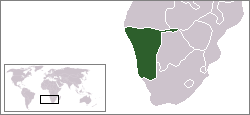LGBT rights in Namibia
| LGBT rights in Namibia | |
|---|---|
 | |
| Same-sex sexual activity legal? | Male illegal since 1920 |
| Discrimination protections | No[1] |
| Family rights | |
| Recognition of relationships | No |
| Adoption | No |
Namibia has a history lacking of laws supporting lesbian, gay, bisexual, and transgender (LGBT) citizens. Discrimination based on sexual orientation and gender identity is not banned in Namibia. Households headed by same-sex couples are not eligible for the same legal protections available to opposite-sex couples.
In November 2012, the LGBT community celebrated the crowing of Ricardo Amunjera as Mr Gay Namibia. The pagent took place at a theatre-restaurant in the capital city, Windhoek. Amunjera went on to later marry his life partner in 2013.[2]
Legality of same-sex sexual activity
Sexual activity between women is legal in Namibia. Sodomy between men remains a crime in the country according to the Roman-Dutch common-law, which was imposed by the South Africans. Namibia kept this law on the books after it became independent in 1990.[1][3] However, there are no cases in which this law was ever enforced.[4]
In August 2016, the United Nations Human Rights Committee released a report in Windhoek, Namibia's capital city, calling on the country to abolish its sodomy ban.[5] Reacting to the Committee's call, John Walters, the Ombudsman of Namibia, whose office is mandated to promote and protect human rights, said that people should be free to live their lives as they see fit. Walters said:[4][6]
I think the old sodomy law has served its purpose. How many prosecutions have there been? I believe none over the past 20 years. If we don’t prosecute people, why do we have the act.
Recognition of same-sex relationships
The Ombudsman of Namibia, spoke in August 2016 on the matter of same-sex marriage and said the following:[4]
If people of the same sex would like to get married, it is their choice, whether the country, the community, churches and government acknowledge that [is something else].
Discrimination protections
Discrimination on the basis of sexual orientation and gender identity is not outlawed in Namibia.
In August 2016, the United Nations Human Rights Committee called on the Government to adopt legislation explicitly prohibiting discrimination based on sexual orientation, including in the Labour Act (Act No. 11 of 2007).[5] Following the Committee's call, the Ombudsman of Namibia, argued that a measure prohibiting discrimination on the ground of sexual orientation needs to be in the Constitution.[4]
Hate crimes
LGBT people in Namibia face discrimination, harassment and violence. Additionally, similarly to neighboring South Africa, lesbians are occasionally the victims of so-called corrective rape, where male rapists purport to raping the lesbian victim with the intent of curing her of her sexual orientation.[5]
In August 2016, the United Nations Human Rights Committee called on Namibia to adopt hate crime legislation punishing homophobic and transphobic violence, and vigorously enforce it.[5]
Public opinion
A 2016 Afrobarometer opinion poll found that 55% of Namibians would welcome or would not be bothered having a homosexual neighbor. Namibia was one of the only four countries polled with a majority in favor.[7] (the others being South Africa, Cape Verde and Mozambique)
Living conditions
In 2005, the Deputy Minister of Home Affairs and Immigration, Teopolina Mushelenga, claimed that lesbians and gay men betrayed the fight for Namibian freedom, were responsible for the HIV/AIDS pandemic, and were an insult to African culture.[8] In 2001, President Sam Nujoma warned about forthcoming purges against gays and lesbians in Namibia, saying "the police must arrest, imprison and deport homosexuals and lesbians found in Namibia."[9] Home Affairs Minister Jerry Ekandjo in 2000 urged 700 newly graduated police officers to "eliminate" gays and lesbians "from the face of Namibia".[10]
Mr. Gay Namibia 2011, Wendelinus Hamutenya, was the victim of a homophobic assault in December 2011 in Windhoek.[11]
In December 2013, McHenry Venaani, the president of the Democratic Turnhalle Alliance, spoke out in favor of LGBT rights and said that people should be allowed to live their private lives without interference.[12]
Summary table
| Same-sex sexual activity legal | |
| Equal age of consent | |
| Anti-discrimination laws in employment only | |
| Anti-discrimination laws in the provision of goods and services | |
| Anti-discrimination laws in all other areas (Incl. indirect discrimination, hate speech) | |
| Same-sex marriages | |
| Recognition of same-sex couples | |
| Step-child adoption by same-sex couples | |
| Joint adoption by same-sex couples | |
| Gays and lesbians allowed to serve openly in the military | |
| Right to change legal gender | |
| Access to IVF for lesbians | |
| Commercial surrogacy for gay male couples | |
| MSMs allowed to donate blood | |
See also
References
- 1 2 State-sponsored Homophobia A world survey of laws prohibiting same sex activity between consenting adults
- ↑ MIYANICWE (2013-04-17). "Everyday is a honeymoon for Mr Gay Namibia and his life partne".
- ↑ Where is it illegal to be gay?
- 1 2 3 4 Namibia’s ombudsman calls for same-sex marriage amidst UN report furore
- 1 2 3 4 UN wants homosexuality legalised in Namibia
- ↑ Let gays be – Walters The Namibian
- ↑ Africa’s most and least homophobic countries
- ↑ "Namibia: African NGOs Respond to Statement by Namibian Deputy Minister on Gays and Lesbians 'Betraying the fight for freedom'", International Gay & Lesbian Human Rights Commission, 13 September 2005
- ↑ "Namibian president announces purges against gays", afrol.com, 20 March 2001
- ↑ "Namibia gay rights row", BBC News, 2 October 2000
- ↑ "Mr. Gay Namibia Assaulted", advocate.com, reported by Michelle Garcia, 12 December 2011
- ↑ Namibian political leader stands up for gay rights
External links
- UK government travel advice for Namibia: Local laws and customs
- Namibia content at International Lesbian and Gay Association